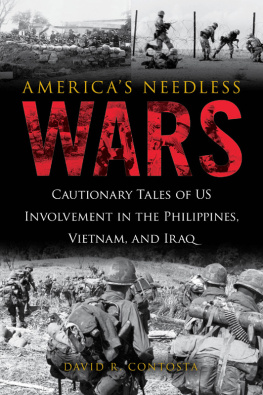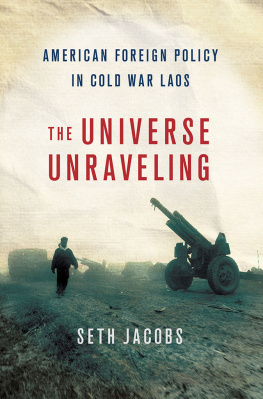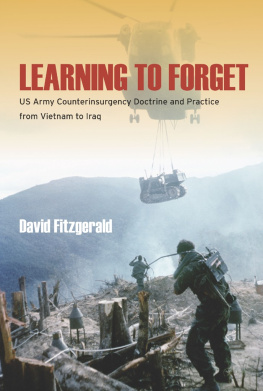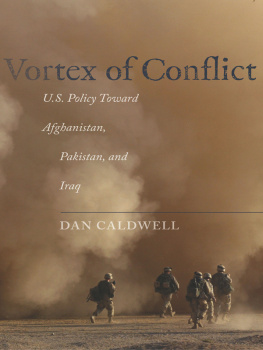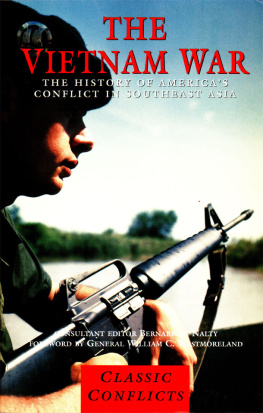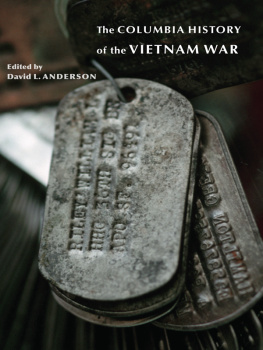
Published 2017 by Prometheus Books
America's Needless Wars: Cautionary Tales of US Involvement in the Philippines, Vietnam, and Iraq. Copyright 2017 by David R. Contosta. All rights reserved. No part of this publication may be reproduced, stored in a retrieval system, or transmitted in any form or by any means, digital, electronic, mechanical, photocopying, recording, or otherwise, or conveyed via the Internet or a website without prior written permission of the publisher, except in the case of brief quotations embodied in critical articles and reviews.
Top right and bottom cover image Getty Images
Cover design by Liz Mills
Cover design Prometheus Books
The Internet addresses listed in the text were accurate at the time of publication. The inclusion of a website does not indicate an endorsement by the author(s) or by Prometheus Books, and Prometheus Books does not guarantee the accuracy of the information presented at these sites.
Every attempt has been made to trace accurate ownership of copyrighted material in this book. Errors and omissions will be corrected in subsequent editions, provided that notification is sent to the publisher.
Inquiries should be addressed to
Prometheus Books
59 John Glenn Drive
Amherst, New York 14228
VOICE: 7166910133
FAX: 7166910137
WWW.PROMETHEUSBOOKS.COM
21 20 19 18 17 5 4 3 2 1
Library of Congress Cataloging-in-Publication Data
Names: Contosta, David R., author.
Title: America's needless wars : cautionary tales of US involvement in the Philippines, Vietnam, and Iraq / David R. Contosta.
Description: Amherst, New York : Prometheus Books, 2017. | Includes bibliographical references and index.
Identifiers: LCCN 2016036641 (print) | LCCN 2017005690 (ebook) | ISBN 9781633882898 (hardback) | ISBN 9781633882904 (ebook)
Subjects: LCSH: Introduction -- Cuban Prologue -- Conquering the Philippines -- Cold War Prelude -- The Vietnam Deception -- The Defeated Giant -- Unraveling Iraq -- The Revelations of History. | United States--Military policy--Case studies. | United States--Foreign relations--Decision making--Case studies. | Intervention (International law)--Case studies. | Philippines--History--Philippine American War, 1899-1902. | Vietnam War, 1961-1975. | Iraq War, 2003-2011. | United States--History, Military. | BISAC: HISTORY / Military / Other. | HISTORY / Military / Iraq War (2003-). | HISTORY / Military / Vietnam War.
Classification: LCC UA23 .C672135 2017 (print) | LCC UA23 (ebook) | DDC 355.020973--dc23
LC record available at https://lccn.loc.gov/2016036641
Printed in the United States of America


I am again grateful to the many friends, colleagues, and family members who discussed this project with me and gave both encouragement and support. I am especially indebted to fellow faculty members here at Chestnut Hill College, particularly Lorraine Coons, Jacki Reich, Anne Pluta, and Kimberly Leahy. I also want to thank the college for granting me a sabbatical and several course releases. Cheering me on were President Carol Jean Vale, SSJ; Academic Dean Cecelia Cavanaugh, SSJ; and Vice President for Academic Affairs Wolfgang Natter. I also bounced ideas off William Walker, a former academic administrator here at the college, a historian in his own right, and a friend of many years. And as always, I am thankful for the never-failing assistance of the staff of the college's Logue Library.
A series of lectures about this book, then in manuscript form, that I delivered at Pyeongtaek University in South Korea helped me to sharpen my thoughts and conclusions as I was making final revisions. These lectures would not have been possible without my excellent interpreter and translator, Dr. Jeongwoo Han. I especially benefited from my discussions with Dr. Nam Kim of Pyeongtaek's Department of American Studies about a variety of diplomatic and foreign policy issues. The hospitality showered on me at Pyeongtaek was unparalleled in my experience. I shall never forget the special kindnesses of University President Dr. Ki Hung Cho, Director of Development Dr. Jung Bok Ha, and Director of External Affairs Kyle Jung.
My walking partners and dear friends, Stan and Leslie Finegold, patiently listened to me spout off about my writing as we made one turn after another around Victory Fields at Plymouth-Whitemarsh High School in Lafayette Hill, Pennsylvania, where we live, and they made some very sound suggestions. And once again, my three daughters, Nicole, Alexandra, and Jessica, and my two sons, David and John, had to hear Dad give impromptu perorations about his latest scholarly passion.
I am delighted once again to be working with Steven L. Mitchell, vice president and editor in chief of Prometheus Books. Members of the Prometheus team have also assisted me at every turn, including Jake Bonar, Jeffrey Curry, Hanna Etu, Mark Hall, Jill Maxick, Lisa Michalski, Lynette Nisbet, Liz Mills, Amy Vigrass, and Cheryl Quimba. In addition, my copyeditor, Jacqueline May Parkison, did a masterful job of putting the manuscript into final form.

Great is the guilt of an unnecessary war.
John Adams
When I was growing up during the Cold War, I had no doubt God was on America's side. The church our family attended proclaimed this belief with an American flag prominently displayed up front on one side of the sanctuary, with a second flag featuring the Christian cross on the other side. As a member of the Boy Scouts of America, I could earn what was called the God and Country award.
Then, as a university student, I learned that believing God was on America's side was nothing new: The English Puritans, who settled Boston and later the rest of New England, believed God had made them a second chosen people and had sent them to the New World to save the corrupt and decadent Old World. For them, Boston was a new Jerusalem and a new Israela new Promised Land. This belief eventually seeped out of New England to much of the rest of America and is still held by many citizens today.
Sometime during college, I shed my belief that God favored Americans above all other people, but I did come to share the principal thoughts of our Founding Fathers during and after the American Revolution. Men like Thomas Jefferson, Benjamin Franklin, and John Adams were sons of the eighteenth-century Enlightenment. They believed that, through reason and experience, Americans could establish a political system and way of life that might save them from the moral stains of that hopeless Old World across the Atlantic.
The Great Seal of the United States says it all; the reverse side includes both religious and secular sentiments about what has come to be called American exceptionalism. One can also find these sentiments on the green side of the American $1 bill: Annuit coeptis, Latin meaning He has favored our undertakings, and Novus ordo seclorum, Latin meaning A new order of the ages.
As I continued to study and then teach American history, I found myself becoming something of a disappointed idealist. I really wanted my country to represent A new order of the agesone that would not repeat the failings of the Old Worldand that meant, among other things, not fighting needless wars. Much later, it struck me that during one long modern lifetime of 105 years, from 1898 to 2003, the United States initiated three wholly needless warsin the Philippines, in Vietnam, and in Iraq.

